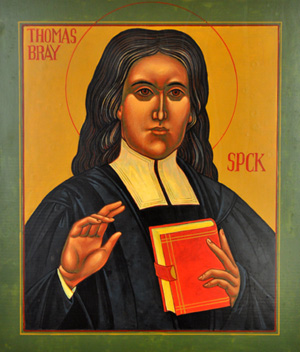As we approach the bicentennial of our founding in 2023, we will share the story of the Diocese of Georgia. This week we remember the Rev. Thomas Bray and his work in Newgate Prison.
 Weekly Beef and Beer Dinners hosted in Newgate Prison by the Rev. Thomas Bray are where the priest planted seeds for what grew into the Colony of Georgia. Bray (1656-1730), who was then the Rector of St. Botolph-Without-the-Walls in London, was deeply concerned about those jailed for their inability to pay off their debts. Through this work, the charismatic priest gathered a group of friends including a young politician, James Edward Oglethorpe. Bray dreamed of a colony where those trapped in debt could gain the opportunity for a fresh start. While the dedicated reformer died before Georgia was founded, the charter for the colony captured his utopian ideal with prohibitions against selling rum, having enslaved people work the land, and owning more than 150 acres per family. The charter also had a prohibition against lawyers and expressed tolerance for Jews as well as some persecuted Christian groups (such as the Salzburgers) to settle. This Christian idealism was the driving force for the founders of the colony. (Louise Shipps painted the icon above. The original painting of Sir Thomas Bray is in the conference room at Diocesan House.)
Weekly Beef and Beer Dinners hosted in Newgate Prison by the Rev. Thomas Bray are where the priest planted seeds for what grew into the Colony of Georgia. Bray (1656-1730), who was then the Rector of St. Botolph-Without-the-Walls in London, was deeply concerned about those jailed for their inability to pay off their debts. Through this work, the charismatic priest gathered a group of friends including a young politician, James Edward Oglethorpe. Bray dreamed of a colony where those trapped in debt could gain the opportunity for a fresh start. While the dedicated reformer died before Georgia was founded, the charter for the colony captured his utopian ideal with prohibitions against selling rum, having enslaved people work the land, and owning more than 150 acres per family. The charter also had a prohibition against lawyers and expressed tolerance for Jews as well as some persecuted Christian groups (such as the Salzburgers) to settle. This Christian idealism was the driving force for the founders of the colony. (Louise Shipps painted the icon above. The original painting of Sir Thomas Bray is in the conference room at Diocesan House.)
Bray was the rare senior clergyman in the Church of England who had spent time in the American colonies. Years before his prison reform efforts, the Bishop of London sent Bray to Maryland as his representative. Though his visit was less than three months, the tour revealed an intellectual poverty that Bray spent the rest of his life addressing. Once he was back home in England, Bray founded the Society for the Proclamation of the Gospel (SPG) to raise the needed funds to provide clergy stipends for the colonies. SPG would in time provide priests for Christ Church in Savannah, and Saint Paul’s in Augusta. Bray also founded the Society for the Propagation of Christian Knowledge (SPCK) to publish books and create lending libraries in the colonies. They founded fifty libraries in Church of England congregations in America. Both SPG and SPCK remain active to this day. Thomas Bray died February 15, 1730, which is marked as a feast day of the Episcopal Church in Lesser Feasts and Fasts.
While the seed Bray planted in a young Oglethorpe did bear much fruit, the colony did not alleviate the plight of prisoners. King George II, for whom the colony was named, approved of Georgia as a buffer between his colonists in the Carolinas and Spanish lands in Florida. The Crown also consented to release of thousands of debtors, but turned them out on the streets of London and other cities without prospect of employment. Ads run in London’s newspaper offered free passage to the new colony, together with land, tools, and all the food needed for the first year. But prospective colonists were picked based on the vocational skills needed rather than their status as debtors. None of the freed prisoners made the trip to found Georgia.
